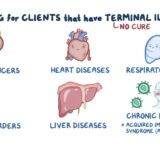A terminal illness is a serious health condition which cannot be cured and may likely to lead to death. People who are terminally ill may have a single illness or a number of different conditions. The most common terminal illnesses include advanced cancer, dementia (including Alzheimer’s), motor neurone disease (MND), lung disease, neurological diseases, like Parkinson’s and advanced heart disease.
Advanced cancer means ancer that is in the later stages or it has spread. Terminal cancer usually means the cancer cannot be controlled and is likely to be the cause of someone’s death. Late-stage heart failure is where the heart’s ability to pump blood can become impaired. In such a case, the heart can longer meet the body’s demands, possibly leading to multi-organ failure or an elevated risk of death. Neurodegenerative diseases indicate the progressive loss of neurons, possibly leading to cognitive and motor impairments. Alzheimer’s disease and amyotrophic lateral sclerosis (ALS) severely compromise an individual’s functional abilities and life expectancy.

People with terminal cancer are often given palliative care or treatment to managing symptoms. Palliative care is an approach that helps to address patients’ physical, emotional and spiritual needs with life-limiting illnesses. There are various components of palliative care such as pain and symptom management, communication, decision-making support and care coordination among healthcare providers. The hospice care is recommended for patients with a life expectancy of six months or less, as it provides comprehensive end-of-life support for the patient and their family.
There are different coping strategies that can benefit people experiencing the effects of terminal illness. For instance, finding meaning and purpose in the moment, practicing gratitude into daily life, and seeking professional help from a therapist or counselor. This help individuals navigate the complex emotions associated with terminal illness and help tailor patient-specific interventions.
